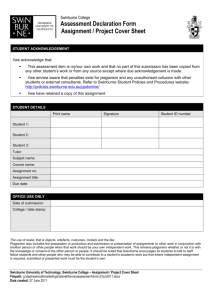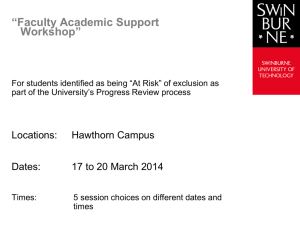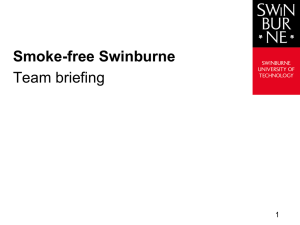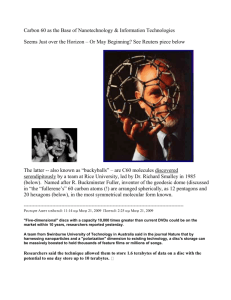Presentation slides (PPT 9.1MB) - Swinburne University of Technology
advertisement
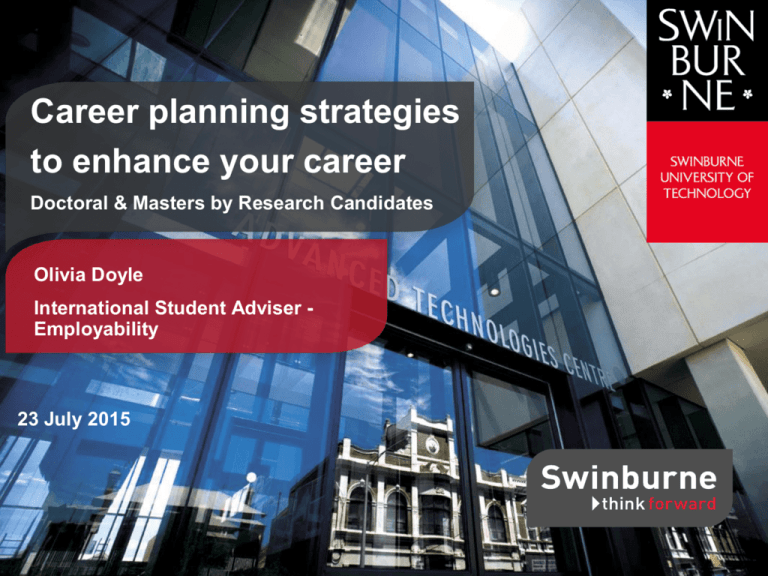
Career planning strategies to enhance your career Doctoral & Masters by Research Candidates Olivia Doyle International Student Adviser Employability 23 July 2015 Swinburne Seminar aims To encourage international research students to: - undertake proactive career planning - focus on enhancing their employability ……. whilst completing studies Agenda Swinburne Career planning for research students Career opportunities for research students Enhancing your employability Guest speakers: Dr Alexe Bojovschi, Researcher, IBM Mr Bon Nguyen, Research Engineer, CSIRO 3 Setting the scene ……. Swinburne Many international students are not adequately prepared for their careers after completing their research studies Even with excellent qualifications, the transition to employment can be difficult To achieve your career goals, you can’t just rely on the qualification – you need to be proactive in your career management Today’s labour market is complex with jobs evolving and changing rapidly – this impacts your career development – planning & opportunity awareness are key 4 Swinburne ‘International students are too focused on their studies and think about careers and employment too late in the careers lifecycle.’ Rob Lawrence, Improving the employment outcomes of international students’ 2013 5 Swinburne Presentation can be accessed at: Yourslides professional career starts NOW UPDATE LINK http://www.swinburne.edu.au/careers/pep 6 International student challenges Swinburne Some common hurdles include lack of: Career clarity Relevant work / professional experience Network contacts Knowledge of valuable personal marketing tools 7 Swinburne Career outlook “Australia needs PhD trained minds to prepare Australia for an environment in which the demand for research will increase as the economy restructures into areas of higher value-add based on high quality innovation.” “The traditional purpose of a PhD was to provide the training necessary to start on an academic career. This is no longer the case and in some countries as few as 5% of PhD graduates find permanent academic positions.” The Changing PhD, Group of 8 Discussion Paper, March 2013 8 Swinburne Increased number of PhD completions 1990 3247 2010 6780 Increased Decreasing proportion of PhD graduates find employment within academia or in research Many find non academic, non research positions where they will not use their disciplinary knowledge and skills directly Academic employment Dependent on grants / funding Too many graduates for roles available Lack of job security Consider other university roles – doctoral qualified often have advantages Don’t overlook opportunities in private industry / government / not for profit sectors Be open to a variety of career options 9 Swinburne - UK Employment Outcomes 2010 study showed: - 44% Higher education - 13% Health & social work - 11% Finance, business, IT - 9% Manufacturing - 9% R&D - 6% Non HE teaching - 5% Public administration - 3% ? - What Do Researchers Do, Vitae (2010) Source: 10 Future Work Skills 2020 Report Swinburne Ten skills for the future workforce = many skills developed in research: 1. Sense-making 2. Social intelligence 3. Novel & adaptive thinking 4. Cross-cultural competency 5. Computational thinking 6. New-media literacy 7. Transdisciplinarity 8. Design mindset 9. Cognitive load management 10. Virtual Collaboration Future Work Skills 2020, Institute For The Future for University of Phoenix Research Institute, 2011 11 Overview of employer expectations Swinburne Public sector jobs -- Research skills -- Policy analysis & development experience -- Project development & implementation -- Strong communication skills -Private sector jobs -- Research skills -- Commercial environment experience to show you have business acumen -- Consulting experience -- Ability to meet deadlines, teamwork, strong communication skills -Academic jobs -- Research skills -- Published work in quality journals -- Teaching & demonstrating experience -- Post doctoral experience -- Personal mobility 12 Do you have a strategy in place to ensure a successful transition from research student to employee? Swinburne The market for jobs in both academia and other sectors is competitive You need to plan ahead, be strategic in your job search and look at ways to stand out from the crowd Start planning as early as possible – preferably in the first year of your candidature – get some clarity about what you are aiming for (career vision) but also be open to opportunities Have in mind what your next step is – don’t focus totally on your research If you are looking to a career in industry consider some commercial focus to your research Use your research as an opportunity to develop industry experience and contacts – opportunity awareness 13 Employability planning tips Swinburne Allocate time to developing a personal career vision based on your: VALUES Intrinsic Values: What motivates me to love my work day after day? Work Environment Values: What working conditions provide an optimum environment in which I can do my best work? Work Content Values: What makes my work activities most satisfying and engaging to me? Work Relationship Values: What characteristics of interaction with others in my workplace are the most important to me INTERESTS PERSONAL SWOT ANALYSIS 14 Personal SWOT analysis Swinburne STRENGTHS What do you do well in your work as a researcher? What are your skills, qualities & strengths? What unique resources can you draw on? What do others see as your strengths? OPPORTUNITIES What opportunities are open to you in the job market? Which employers will value your strengths & specialist knowledge? What trends & growth sectors can you take advantage of? 15 Personal SWOT analysis Swinburne WEAKNESSES What could you improve? In which aspects of your research do you least excel? What are others likely to see as weaknesses? THREATS What are the external factors which may inhibit opportunities? What is your competition doing? What are the potential gaps in your experience and skills which will block you achieving your career goals? 16 Actions you can take NOW to positively influence your future career success Network Develop skillset Gain relevant experience Publish research Update your job search toolkit Research what others have done / are doing Find a professional mentor Build your personal brand Swinburne Research what employers are looking for Other? 17 Swinburne Text line Announcing International Student SKILL DEVELOPMENT SEMINARS commencing Semester 2 2015 18 International student employability SKILLL development seminar series Swinburne Seminars Essential graduate employability skills to build your career Soft skills employers expect Tactics to build your skills while you study Communication skills for the workplace Meetings, phone calls, emails and other communications in a professional setting Polish your verbal communication style Contemporary business writing principles Enhancing your performance in work teams Strategies for working effectively in teams Business skills & etiquette Navigating the modern workplace Using emotional intelligence in the workplace Strong emotional intelligence is a key to business and career success Interact effectively with others Develop strong relationships Manage conflict Personal motivation www.swinburne.edu.au/student/international/employability/ 19 Useful career resources Swinburne Career planning for PhDs e book Jobs.ac.uk The changing PhD discussion paper Group of Eight A degree of certainty – career options for postgraduate research students Australian National University Your academic career at Swinburne Career support for researchers Australian Council of Learned Academies Beyond the PhD website Vitae website 20 Guest speakers Swinburne Dr Alexe Bojovschi Researcher IBM Mr Bon Nguyen Research Engineer CSIRO 21 What the future will hold? “If there is a will there is a way.” Proverb How to get from here to there? Alexe Bojovschi IBM Research Australia Core skills Research Analytical Writing Problem solving Organisational Differentiating Core skills Public Speaking Soft-skills Mnemonics Speed reading Mind mapping What do we need to do ? Learn Organise Visualise Execute My journey SWINBURNE University - PhD parallel programming & nano-engines - President of Swinburne Explores Club - HR and technical manager of Geneyas (A young achievement Australia Company) - Virtual Reality – movie making skills - Master of IT skills - Aussie Ice-skating member VPAC RMIT University US AFRL – DSTO – RMIT University IBM Research Australia “Be water my friend” - Bruce Lee Thank you Bon Nguyen (Former student from Swinburne 2001) Research Engineer Fluid Dynamics Mineral Resources Flagship July 2015 MINERAL RESOURCES FLAGSHIP CSIRO - Overview People 5034 Darwin 9 Flagships Cairns Atherton Townsville 2 sites Budget $1.2B+ Alice Springs Rockhampton 64% of our people hold Bribie Island Murchison university degrees over 2000 hold doctorates over 500 hold masters Brisbane 6 sites Gatton Myall Vale Narrabri Geraldton 2 sites Armidale 2 sites Mopra Perth 3 sites We develop 832 postgraduate research students with our university partners Toowoomba Newcastle Parkes Adelaide 3 sites Irymple Griffith Wodonga Werribee 2 sites Belmont Geelong Sydney 5 sites Canberra 7 sites Melbourne 5 sites Hobart Sandy Bay Partnering for Impact In FY13/14, CSIRO undertook research and services with over 2800 clients and partners Strong Focus on Industry 1,749 Australian private sector organisations including: • 408 multi-national corporations • 518 large private corporations • 1,176 SMEs CSIRO is involved in 36 CRCs and is the largest single participant in the CRC program CSIRO has facilitated 43 SME Researchers in Business projects Global connections: Impact partnerships + 80 countries Our Flagships AGRICULTURE BIOSECURITY DIGITAL PRODUCTIVITY AND SERVICES FOOD AND NUTRITION LAND AND WATER MANUFACTURING MINERAL RESOURCES OCEANS AND ATMOSPHERE ENERGY Mineral Resource Flagship Targeted impact across the value chain… new Unit Operations & Process Design Group’s focus: • Measurement, simulation and modelling chiefly of multiphase flows and solid-liquid separation processes Core Capabilities: • Computational Fluid Dynamics (CFD) • Physical fluid flow modelling • Multiphase flow • Pipeline and valve erosion modelling • Slurry and non-Newtonian fluid transportation • Solid liquid handling • Dewatering, consolidation and sedimentation • Flocculation, flotation and aggregation Technology that enhanced oxygen transfer in Gold production 40% Saving in Oxygen Consumption Swirl flow technology • Doubling tank service life from reduced scaling rate CSIRO invention – SFT Technology Conventional: Draft Tube Installation Slurry Mixing and Agitation-PI (Process Intensification) Solve slurry agitation problems: •lower extraction recovery •mass transfer limiting •mixing consistency •sedimentation •scale •erosion •high consumption- acid, reagents >solutions implemented in ~300 mixing tanks globally since early 1990 >~40 science journal publications; > 2 patents Typical postgraduate entry level positions - There are three sets of typical entry level positions. - 1) For bachelor degree graduates, the starting level is ~$70 k/year. 2) For Masters graduates, the starting level is ~$80k/year. 3) For post-docs position, the starting level is ~$82k/year - We also take vacation students from 3-4th year uni over the summer to work on small projects. (This is also an excellent opportunity for the future graduate students) Key attributes that employers want 1. Ability to work effectively in a team structure 2. Ability to make decisions and solve problems (tie) 3. Ability to communicate readily with people inside and outside an organization 4. Ability to plan, organize and prioritize work 5. Ability to obtain and process information 6. Ability to analyse quantitative data 7. Technical knowledge related to the job 8. Proficiency with computer software programs 9. Ability to create and/or edit written reports 10. Ability to sell your ideas and influence others Tips to develop these skills • In any job you do (part-time/casual) emphasise the team work aspect. • Try to learn something new every day. • Volunteer! People who volunteer for new challenges are more likely to succeed and gain valuable experience. • Work out what motivates you and find out how others differ from you. General job search tips 3. Connect with connections. Join related industry (ie LinkedIn or google+) 1. Resume 2. Where to find jobs? 4. Knowing your targeting companies 5. Talk to the insiders 6. Meeting a least once or twice a week General job search tips These links provide an overview of the hidden market in Australia, where approx 70% of the jobs are not advertised It’s through networking that one finds employment. http://www.businessinsider.com.au/tips-for-penetrating-hiddenjob-market-2014-6 http://www.womensagenda.com.au/career-agenda/builders/thehidden-job-market-where-to-find-it-and-how-to-accessit/201408044413#.VaSE2_mqpBc Cultural insights into adapting to the Australian workforce - The culture and practices at work are quite different from your country. - Familiarise yourself with the cultural practices in Australia workplace. Some typical examples: - Workers talk on equal basis with their managers and sometimes with a sense of humour is quite acceptable. It’s quite acceptable to address your work colleagues as “mate” It is perfectly acceptable to have communications that are not related to your work, e.g footy, sports. Respect your colleagues and customers. Inform your colleagues and managers if you are going to be late or absent from work. Thank You Bon Nguyen MINERAL RESOURCES FLAGSHIP Swinburne Olivia Doyle International Student Advisor - Employability International Student Life Tel 9214 8248 Email odoyle@swin.edu.au SCIENCE | TECHNOLOGY | INNOVATION | BUSINESS | DESIGN 46
